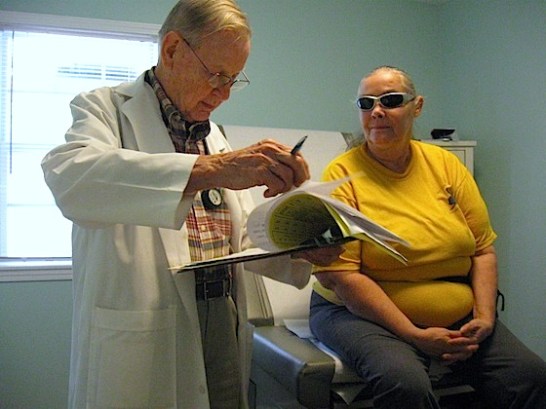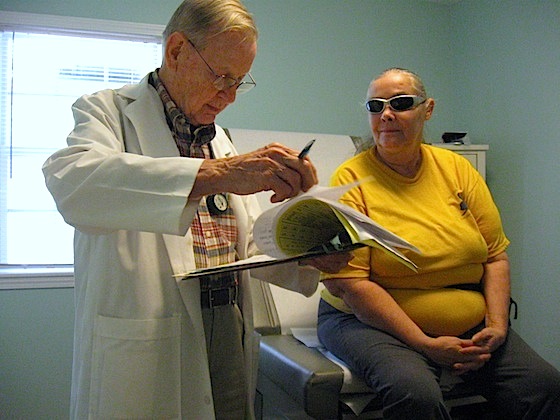
The clinic’s waiting room filled up quickly Wednesday morning, and there were still more patients waiting outside, sitting on the porch of the converted home.
Good Shepherd Clinic, which provides free medical services to the uninsured of Clayton County, is a busy place every Monday and Wednesday, the only days when it’s open.
Patients and staff squeeze past each other in the narrow hallways, and there’s a steady flow of people in and out of the exam rooms.
The Morrow clinic draws people such as Lois Joiner, 63, of Forest Park. Joiner is unemployed and hasn’t had health insurance in five years. She has high blood pressure and high cholesterol, and has a regular appointment at Good Shepherd every three months.
When asked where she would be without the clinic, Joiner promptly answered: “The emergency room.’’
The day after the U.S. Census Bureau reported that nearly 50 million Americans had no health insurance in 2010 – a record high – Good Shepherd staff and patients said they weren’t surprised that the number is increasing.
“Nobody is working,’’ said Gary Shelton, 49, of Forest Park, who has diabetes and high cholesterol. He’s a refinisher of hardwood floors, but he hasn’t gotten many jobs in the past few years.
“There’s hardly any way to pay’’ for care, he said as his blood pressure was being taken.
Good Shepherd, like other free and charitable clinics in the state, is seeing greater demand for services.
Unemployment in Clayton County, just south of Atlanta, hovers at 13 percent, higher than the state and metro Atlanta rates. About 20 percent of county residents have no health insurance, roughly the state average.
Georgia’s uninsured rate ranked sixth among states in a three-year average in the Census report.
Many patients at Good Shepherd are the working poor, who either are not able to afford insurance or are not offered such coverage by their employers, said Jim Phillips, a former Delta Air Lines employee who’s chairman of the board of the clinic. “We have about a four-month waiting list.’’
Faith and generosity keep effort going
Georgia has 96 free and charitable clinics, the highest total of any state, said Donna Looper, executive director of the Georgia Free Clinic Network.
Much of the spread of these clinics in Georgia comes thanks to churches and other faith-based organizations, she said, with about 70 percent of the clinics having such affiliations.
“They’ve stepped up to the plate and filled the void in their communities,’’ Looper said of the religious groups.
The state’s clinics served 320,000 patients last year, and the persistent economic slump keeps pushing demand higher. Waiting lists for appointments run from six weeks to six months, Looper said. “Some clinics can’t even keep up with a waiting list.’’
The patients generally have chronic disease such as diabetes and hypertension, and part of Good Shepherd’s $280,000 annual budget goes to purchase medications. The clinic also gets drug samples and links patients to free medication programs run by pharmaceutical manufacturers.
Individual donations supply much of the money that the clinics run on.
The medical care is donated, too. One of the volunteers at Good Shepherd is Dr. Charles Johnson.
A primary care physician for more than 50 years, Johnson, in his 80s, joked that the volunteer work “keeps me off the streets.’’
“I love the practice of medicine,’’ he said. But he added that he can’t see all the patients who need help. “We don’t have enough physicians,’’ Johnson said.
Another volunteer is medical assistant Elaine Saperstein, who along with her husband, Jay, is unemployed. Her husband has diabetes, she said. “If it wasn’t for this place, my husband couldn’t get his medications, his insulin,’’ she said.
‘A never-ending battle’
But even this valuable safety net has some large holes.
If a Good Shepherd patient needs to see a physician specialist, it’s very difficult to get a referral, said Lisa Page, the clinic administrator. She told the story of a patient with leukemia whom the clinic finally had to send to a hospital emergency room, along with his medical paperwork.
Orthopedists are hard to find to set a broken bone, Page said.
Good Shepherd is open just a few hours a week. It would need to be open 40 hours-plus to meet the demand, Page said.
“It’s a never-ending battle,’’ she said, adding that the clinic is trying to hire a part-time nurse practitioner.
The patients are grateful to be there. “I don’t have the out-of-pocket money to pay for doctor visits and prescriptions,’’ said Hazel Moore, 62.
And Caron Anderson, 59, had a stark answer when she was asked what would happen if she didn’t have access to Good Shepherd. “Without it, I’d just be suffering,’’ she said.

